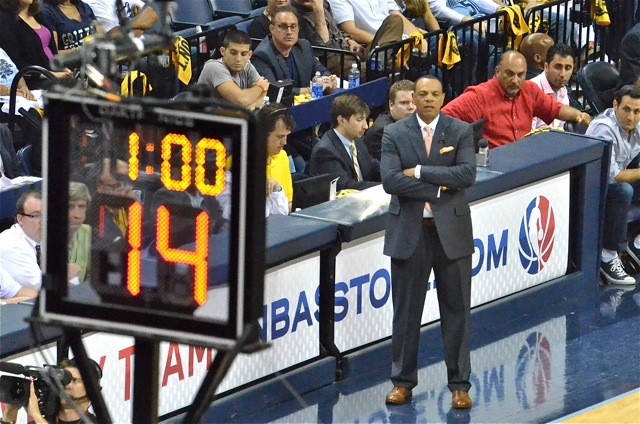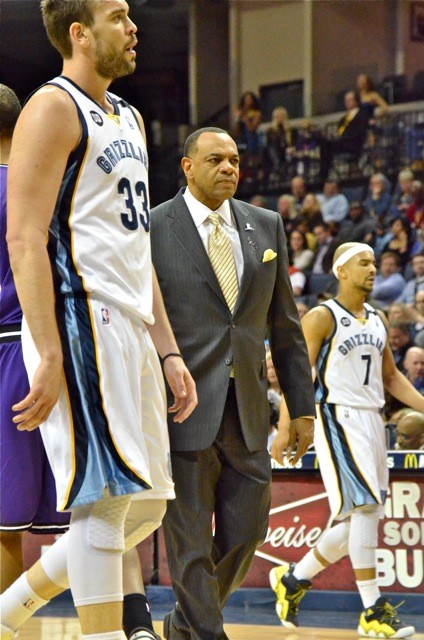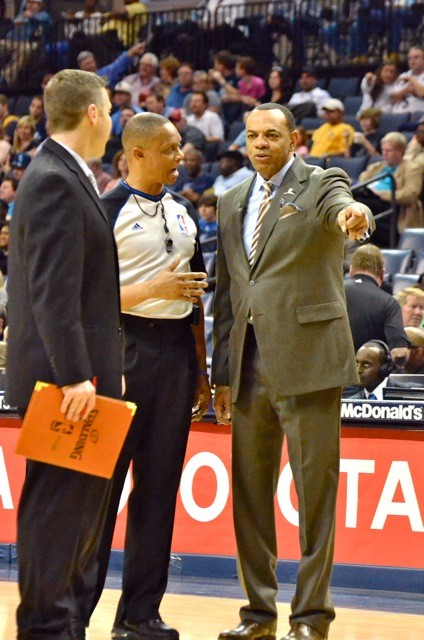As previously shared on this here internet website, a new treasure trove of the writings of Plato was recently discovered, containing several heretofore unknown dialogues between Socrates and a group of basketball fans. In this installment, as yet untitled, Socrates seems to be discussing the feelings of Griz fans about the Grizzlies’ first-ever home game against a team coached by former Griz coach Lionel Hollins. It could take scholars years to discern the true meaning of this text, but that doesn’t mean it’s not worth sharing here.
Two men are talking to Socrates about the Grizzlies’ home game against the Brooklyn Nets, who are coached by one Lionel Hollins. They are indentified in a portion of the text which has been lost to the ages, and thus are referred to as Fan #1 and Fan #2.
 Larry Kuzniewski
Larry Kuzniewski
F1: I just think that scumbag Levien never should have fired him in the first place.
F2: He wasn’t fired—I’m just not going to address calling Levien a scumbag&mdsah;he wasn’t fired, they just didn’t renew his contract.
F1: It’s the same thing, and you know it.
S: Is it the same thing, though?
F1: It is. They replaced him with a new coach, didn’t they?
S: To be fired implies a job performance so poor that they had to let him go. It would seem that simply not being offered a contract extension could indicate someting else.
F2: Exactly. I’ve been saying this ever since it happened—that they didn’t fire him. He was greedy. He wanted too many years and too much money.
S: From where did you get this information?
F2: I, well, I got it from the internet.
[jump]
S: From someone whose reputation you trust?
F2: From Twitter.
F1: All those media people on Twitter hate Lionel so much. They couldn’t wait for him to get out of town.
S: If that were true, why do you think that would be the case?
F1: Because they’re all a bunch of crybabies. They think Lionel was mean to them, because he wouldn’t give them a bunch of softball press conference answers. They just want somebody who’s gonna lay down and make it easy to write their stories.
F2: Oh, whatever. The guy was a jerk! There’s no need to be so hostile when people who are just doing their job ask you a question.
F1: Sure there is! All those media people, they didn’t want him to be the coach. They didn’t like him. All they ever did was complain about how he needed to shut up and do his job.
F2: He did need to shut up and do his job.
S: What do you mean when you say that? What was his job?
F2: His job was to win basketball games.
F1: Which he did.
F2: Yeah but they were so ugly at it. They couldn’t ever score.

F1: Scored enough to get to the Western Conference Finals.
F2: Only after they traded away Rudy Gay so that the offense had to flow through Z-Bo. Everybody knows he didn’t like Tony Allen, the best defensive player in the league.
S: Are you sure that he didn’t like him? Or do you think maybe he didn’t trust him in certain situations—situations where Tony’s recklessness could’ve hurt the team.
F1: He is reckless. He needed Coach Hollins to rein him in.
F2: They were so much better when Tony played more than 25 minutes, though. They still are. It’s not rocket science. Tony has to play for the Grizzlies to get anywhere.
S: Did he not play Tony Allen enough, though? How much farther do you think the team could’ve gone if Tony Allen played even more minutes than he already did?
F1: This is exactly what I’m saying, Socrates.
S: And do you not admit that Tony Allen is a much superior player to Xavier Henry?
F2: Oh, man, Socrates, you just owned that guy.
F1: That seems like a cop-out, though. Everybody knows that was stupid. But that was Tony’s first year. He was still an unknown quantity then—I mean he played really well for Boston in the Finals, but, like, you just didn’t know he was going to be that good.
 Larry Kuzniewski
Larry Kuzniewski
S: It seems that we’re litigating how to feel about his return to Memphis based on starting lineup decisions he made in 2010. Is that the right course of action?
F2: It’s just an example of what I’m talking about. The guy was way too stubborn about what players he liked and what players he didn’t—there’s a reason he sent so many backup point guards packing.
S: What reason do you think that is?
F2: Because he doesn’t like anybody. All he does is tear people apart when they make mistakes, and sit them back on the bench for a week.
F1: He had nobody to work with. Jeremy Pargo? Josh Selby? Washed-up Gilbert Arenas? Which one of those guys was supposed to be the one who stuck?
F2: He destroyed O.J. Mayo. O.J. Mayo was an incredible player under Iavaroni.
S: I do not think that is a name we should use on these hallowed grounds. Let us banish the memory of Iavaroni.
F2: Fair enough.
F1: O.J. Mayo would’ve flamed out anyway, man. He just doesn’t have the mental toughness he needs to make it as an NBA starter.
F2: Do we know that, though? How would we even know? He spent so much time in the doghouse, and then wanting to be a point guard—remember when Lionel made him play Summer League? When he made him play backup point guard in the playoffs?
S: I appreciate the catharsis of this conversation, but I don’t think these are the issues that will cause people to be conflicted about Lionel Hollins when he returns to Memphis.
F1: Exactly. These people are just mad. They need something to be mad about because Lionel never played nice with them.
F2: I don’t know why you think there’s some sort of vendetta here. I don’t understand this at all.
F1: Because the media didn’t like Lionel and they turned everybody against him. He wasn’t even mad at the front office, he just answered questions.
S: Clearly this is something about which you both still feel very passionately. What will your reaction be when Lionel is announced as head coach of the Nets on Tuesday night?
 Larry Kuzniewski
Larry Kuzniewski
F1: I’ll cheer for him just like I did when he was the head coach of the Grizzlies. I wish he were still the head coach of the Grizzlies. He made these guys who they are. He taught them how to win. They wouldn’t be where they are today if it hadn’t been for Lionel Hollins.
F2: I’ll clap and then I’ll hope that he loses. He was the right coach for the Grizzlies when they were young and inexperienced and he could boss them around, but that passed, and that’s why he’s not here anymore. He never developed anybody other than Mike Conley, and you could say that Conley would’ve been good no matter what.
S: Both of those things are unknowable, though. We don’t know how Mike Conley would’ve turned out if not for Hollins, although it’s fair to say that Hollins had a big role in shaping him as a player.
F1: See? I told you.
S: But we also don’t know how well the Grizzlies would’ve done with a different coach. We’ll never know the extent to which Hollins taught the team how to win, even if the players say he did. We just won’t ever know the answer to that question.
F2: Which is why it’s a good thing they got rid of him.
F1: So you do admit they got rid of him.
F2: You know what I mean.
S: So why then the need to all have the same response?
F1: Because he deserves better.
F2: Because I’m right.
S: I think you see what I’m driving at.
F1: You’re saying that there’s more than one way to look at it—more than one way to respond, and that all of these responses are appropriate.
S: While it’s important to remember that rightly or wrongly, Hollins is the most successful coach in Grizzlies history. And that no matter how complicated your feelings about it—or, really, even if your feelings are uncomplicated contempt—that’s still a fact that must be dealt with in any accounting of the situation.
F2: Well I might clap politely, but I want him to lose.
F1: And I want him to win by 100.
S: You do realize he brings Brook Lopez and Deron Williams off the bench, right?
F1: Wait, what?